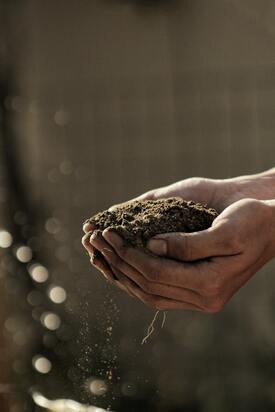|
Have you ever thought of making your own compost to fertilize and nourish your vegetable garden and flower beds? Backyard composting is one way to keep the city of Chadron a beautiful and healthy place to live. Composting is an easy and environmentally friendly way to recycle food scraps from your kitchen and dried leaves and grass clippings from your yard and turn them into nutrient rich fertilizer for the soil. To make a composting container only requires minimal supplies and the results are a natural healthy fertilizer that recycles waste that would otherwise end up in the landfill, and it helps to save money you would have spent on fertilizers and soil-enhancers to feed your plants.
Making compost does not require rocket science. It is a simple and cost-effective process. However, you must keep in mind that too much of one type of matter can affect the smell and texture of your compost. In order to keep your yard smelling pleasant, you have to tend what goes into your compost pile. Teulon (2014) says, “The ideal compost pile is a balance of brown and green matter. Too many leaves, which are high in carbon, can slow it down. Too many grass clippings, which are high in nitrogen, and the pile may starve itself of oxygen and go anaerobic (another word for smelly).” The “brown” or carbon matter in your compost could include straw, shredded cardboard, and dried leaves. Vegetable peelings and fresh grass clippings are considered “green” matter and will help to balance the pile because they are high in nitrogen. The cheapest method for composting is to dig a small hole somewhere in your yard and dump your compost there. This method does not require any tending, but it will take a lot longer for the matter to break down into usable compost, sometimes up to two years. If you want to speed up the composting process, you have to turn and mix your compost pile every once in a while, so that fresh air and insects can help to break it down faster. Because fresh air is one of the key factors to speeding up the composting process, many people choose to make compost bins using wood slats and chicken wire. They leave spaces between the wood so that all the compost in the bin is getting access to air. This helps the compost pile to break down evenly. Another method that is popular among hobby farmers and gardeners is the compost tumbler. Compost tumblers are obviously more expensive than just digging a hole in the ground or using a few pieces of wood, but they save a lot of time and effort that would be spent turning your compost pile and the composting process can be accelerated. Teulon (2014) states: "If your pile or drum holds more than 1 cubic metre of waste, the decomposition can become so rapid that temperatures soar, helping heat-loving, or thermophilic bacteria to flourish. If your compost is turned and aerated on a regular basis, the thermophilic bacteria will remain active and can raise temperatures upwards of 150°F (66°C), quickly breaking down plant material, killing off seeds and plant pathogens. Comparatively, a small composter or pile will not reach such high temperatures, which could lead to a composting time of roughly two years for the same amount of waste." A natural cooking process occurs which helps heat-loving bacteria to breakdown the material and change it into a useful fertilizer for your garden. Composting is a great way to keep Chadron beautiful because it recycles the kitchen scraps and yard waste that would otherwise go into the dumpster to rot and smell up our neighborhoods. The composted material fertilizes plants and makes them healthier and more productive. Flowers bloom for longer periods and vegetable gardens will be more productive. Composting is simple and cost effective, and is something that people of all ages can do to help the environment and beautify our community. Reference: Teulon, W. (2014). Backyard Composting. Gardens West, 28(6).
0 Comments
Leave a Reply. |
AuthorStef Glass is the Education Coordinator for Keep Chadron Beautiful. She graduated from Chadron State College with her BA in English Literature and minors in History and Creative Writing in May of 2018. Archives
June 2022
Categories |
Proudly powered by Weebly


 RSS Feed
RSS Feed